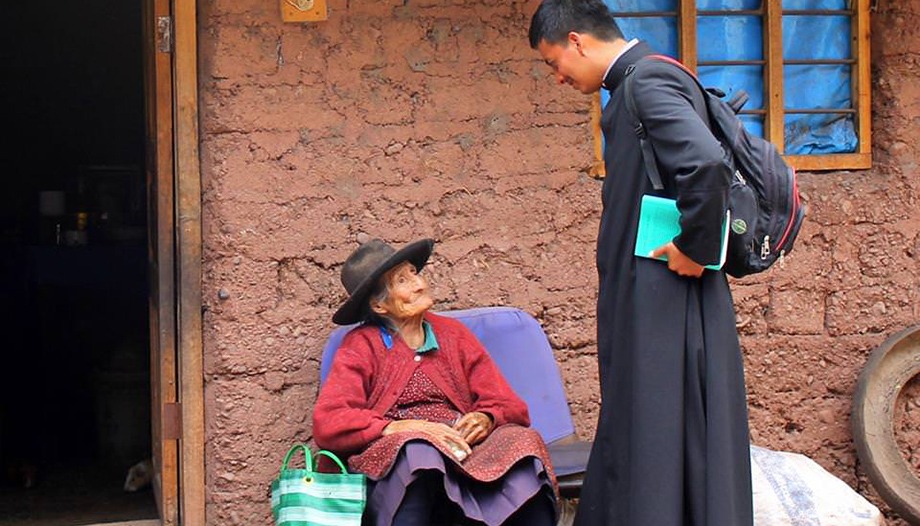On this day in the year 1660, Saint Louise de Marillac died in Paris. As a teenager, she wanted to become a nun, but her poor health prevented her from doing so, so she married a man with whom she shared 12 years of difficult marriage. When her husband died, she consecrated herself to the Lord by serving the poor and the sick, accompanying St. Vincent de Paul in starting the Society of St. Louise de Marillac. the Daughters of Charity.
Her life teaches us that the Christian vocation is one: holiness, and that this is developed in the concrete circumstances in which God makes himself present in the history of each one of us. Louise was a saint when she was single, married and consecrated, because her life was a letting herself be made by the Lord in each of those three states.
In the days leading up to the feast day of San JoseThe Church is holding its traditional Seminary Day campaign. It is a time for reflection on vocations and to encourage young men to consider their possible call to the priesthood. Of course, it is important that priestly vocations arise, but I think that, without realizing it, we project a certain predilection for one vocation over others, which, in my opinion, could be counterproductive today.
Until a few years ago, in our sociologically Catholic societies, marriage was the norm. It was considered the natural call and many people got there almost without thinking about it. They met a boy or a girl, started dating and got married in the Church because that was what everyone did. Those who deepened their faith, came to a more serious reflection about their vocation and they could consider the priesthood or the consecrated life. Marriage too, but as what it is: a sacrament of service to the community, a path to holiness.
Today things have changed a lot. If in the year 2000 75% of the weddings celebrated in Spain were Catholic, in 2020 this percentage dropped to 10%. Even so, many of those few who still go to parish offices to request the sacrament do so manifestly against it, because they have not waited for the link to live together and are not willing to accept what faith reveals to us about its meaning and purpose. In these circumstances, Christian marriage is still very much devalued today within the Church itself and it is normal that it continues to be considered a "second-rate" vocation, because it is blurred.
In the preface to the Catechumenal Itineraries for Marriage and Family Life of the Dicastery for the Laity, Family and Life, Pope Francis reflects on this reality by calling attention to "the fact that the Church devotes much time, several years, to the preparation of candidates for the priesthood or religious life, but devotes little time, only a few weeks, to those preparing for marriage."
It does not occur to us to ordain a young man, no matter how much desire and conviction he may have for his priestly vocation, after giving him an eight-session or weekend course. Nor do we imagine admitting a candidate to the priesthood after an eight-session or weekend course. consecrated lifeHowever much in love she may be with the charism of the foundress, without a long period of novitiate and vocational discernment. But, to gain access to the sacrament of matrimony, it is enough to take your boyfriend or girlfriend by the arm, attend a few talks and off you go, to found a domestic Church for life according to the designs of the Lord!
By presenting marriage as an inferior vocation, since less preparation or discernment is needed to enter it, we are causing many to enter it deceived, for while in the past social customs accompanied the spouses, what today's society understands as living as a couple has nothing to do with the Christian family. Some marriages are directly null and void and many others fail because they are closed to sacramental grace.
But this undervaluation of the marriage may also close the doors to many potential candidates for ordination who may not believe themselves capable of meeting the (supposedly) higher requirements of the priesthood, opting for the always easier (apparently, out of ignorance) married life.
Let us not make distinctions when presenting to young people the different ways in which the Lord can call them. With the teachings of St. Louise de Marillac, in the midst of the Seminary Day campaign, let us encourage the only Christian vocation: holiness, service, absolute dedication of one's own existence... And let God be the one who calls through the different forms of life, which are not so far from each other. St. Joseph, patron of seminaries and married to boot, can also serve as an example.
Journalist. Graduate in Communication Sciences and Bachelor in Religious Sciences. He works in the Diocesan Delegation of Media in Malaga. His numerous "threads" on Twitter about faith and daily life have a great popularity.








